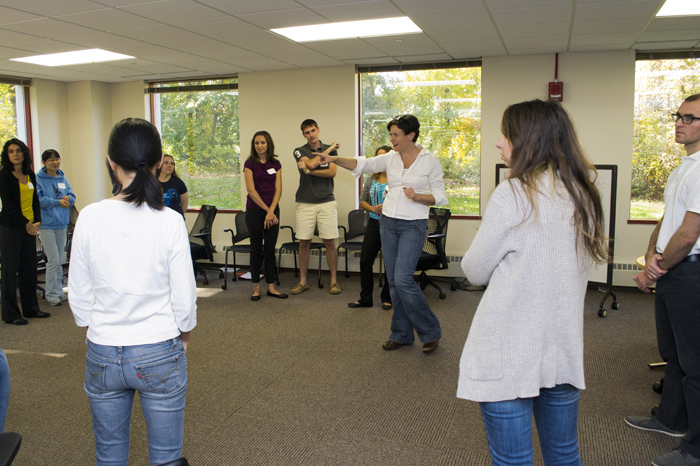
Collaborating across scientific disciplines is often the key to a researcher’s success. As Bioscience Connecticut takes shape and the Jackson Laboratory for Genomic Medicine increases its presence on campus, knowing how to communicate effectively with colleagues will be crucial.
A workshop aimed at improving communication skills was held recently in Jackson Genomic Medicine’s temporary home in the Administrative Services Building at the UConn Health Center. The workshop was limited to two dozen graduate students, postdocs, and faculty. They represented a variety of disciplines in the University, including the schools of medicine and dental medicine, education, engineering, college of liberal arts and sciences, college of agriculture and natural resources, and the Jackson Laboratory.
“A lot of times collaboration fails, not necessarily because the people don’t have great ideas, or because people don’t want to work together,” says Yu-Hui Rogers with Jackson Labs. “A lot of times it’s because they don’t have the right tools in understanding how to communicate with each other effectively and how to make the relationship work.”

“For example, mathematicians trying to work with biologists don’t necessarily speak the same language,” says Gerald Maxwell, associate dean for postdoctoral and external affairs at the Health Center. “A lot of techniques used in these workshops help people to understand the sources of their differences and give them tools for how to solve these problems rather than giving up in frustration.”
The workshop was led by Jenifer Alonzo, an assistant professor of communications and theater arts at Old Dominion University in Virginia who has a National Science Foundation grant to travel the country helping scientists develop their interpersonal skills. The grant is evidence that the federal government takes the issue seriously.
“If we make things more equitable, reduce areas of potential conflict, then our work is actually going to get done much faster and much more efficiently and in a process that is much more comfortable for everyone,” says Alonzo. “Greater comfort equals greater success.”
The workshop offered hands-on training and introduced tools that actors use to foster healthy communication, for instance, ways of building rapport; developing better listening skills; and communicating during a conflict.
“We rehearse having a difficult conversation,” says Alonzo. “People in the workshop will suggest things that are bothering them in their professional lives. Then other group members will suggest strategies on how to change the work environment to help make it more equitable and collaborative.”
“You accomplish more if you’re working with people with different perspectives,” says workshop participant Cibele Falkenberg, a postdoc in the Center for Cell Analysis and Modeling. “There is so much multidisciplinary work that needs to be done in science now and the way to make it happen faster is if you join knowledge from different people.”

Tania Huedo-Medina, an assistant professor of biostatistics in the Department of Allied Health Sciences, feels the skills she learned in the workshop will carry over to the lab. “I’m a faculty member and I need to create my own research group. Learning these communication techniques will help me make sure everyone is happy, meeting their goals and making progress in our research.”
Most of the participants were graduate students and postdocs, which Rogers says is a good thing. “You want to get them when they’re young and their careers are just starting. You want to start them on the right foot.”
The workshop was sponsored by the Office of Postdoctoral and External Affairs at the Health Center, the Institute for Systems Genomics, and the Interdisciplinary Collaboration Laboratory (iCLUB).
Follow the UConn Health Center on Facebook, Twitter and YouTube.



